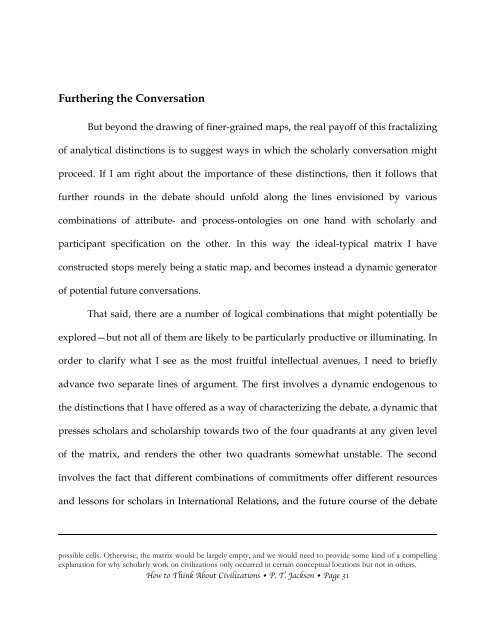How to Think About Civilizations - The Watson Institute for ...
How to Think About Civilizations - The Watson Institute for ...
How to Think About Civilizations - The Watson Institute for ...
Create successful ePaper yourself
Turn your PDF publications into a flip-book with our unique Google optimized e-Paper software.
Furthering the Conversation<br />
But beyond the drawing of finer-grained maps, the real payoff of this fractalizing<br />
of analytical distinctions is <strong>to</strong> suggest ways in which the scholarly conversation might<br />
proceed. If I am right about the importance of these distinctions, then it follows that<br />
further rounds in the debate should unfold along the lines envisioned by various<br />
combinations of attribute- and process-on<strong>to</strong>logies on one hand with scholarly and<br />
participant specification on the other. In this way the ideal-typical matrix I have<br />
constructed s<strong>to</strong>ps merely being a static map, and becomes instead a dynamic genera<strong>to</strong>r<br />
of potential future conversations.<br />
That said, there are a number of logical combinations that might potentially be<br />
explored—but not all of them are likely <strong>to</strong> be particularly productive or illuminating. In<br />
order <strong>to</strong> clarify what I see as the most fruitful intellectual avenues, I need <strong>to</strong> briefly<br />
advance two separate lines of argument. <strong>The</strong> first involves a dynamic endogenous <strong>to</strong><br />
the distinctions that I have offered as a way of characterizing the debate, a dynamic that<br />
presses scholars and scholarship <strong>to</strong>wards two of the four quadrants at any given level<br />
of the matrix, and renders the other two quadrants somewhat unstable. <strong>The</strong> second<br />
involves the fact that different combinations of commitments offer different resources<br />
and lessons <strong>for</strong> scholars in International Relations, and the future course of the debate<br />
possible cells. Otherwise, the matrix would be largely empty, and we would need <strong>to</strong> provide some kind of a compelling<br />
explanation <strong>for</strong> why scholarly work on civilizations only occurred in certain conceptual locations but not in others.<br />
<strong>How</strong> <strong>to</strong> <strong>Think</strong> <strong>About</strong> <strong>Civilizations</strong> • P. T. Jackson • Page 31
















